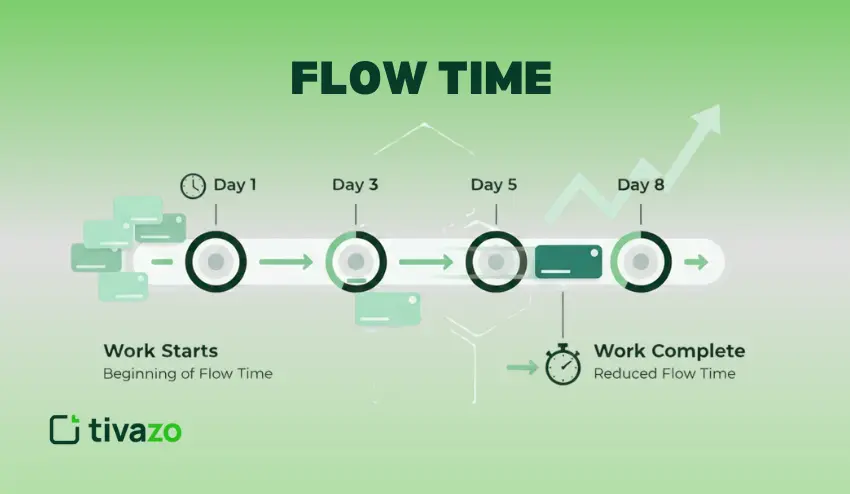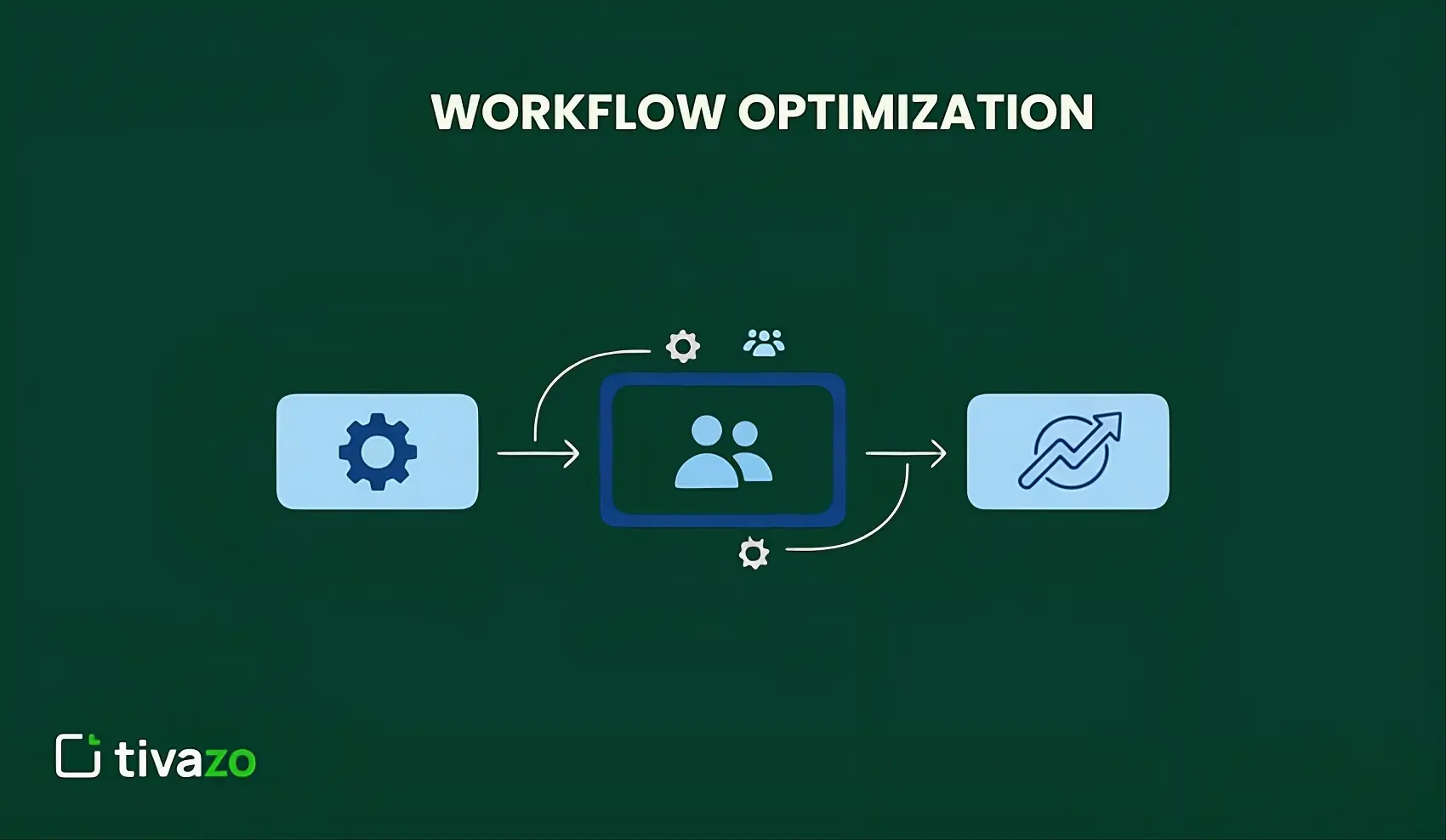Are you a workaholic? You might not even know it yet, but your approach to work may be affecting your health, productivity, and relationships. In today’s busy life, it’s easy to be caught up in the grind, working yourself to the bone. While dedication is indeed necessary, working towards an addiction can happen quickly.
In this blog, we will examine how to identify workaholic behaviors, understand their negative effects on our overall performance, and, most importantly, find practical solutions to break the cycle of workaholism and live your lives again.
Key Highlights:
- What is Workaholism
- Negative Impact of Being a Workaholic
- How to Recognize if You Are a Workaholic
- Proven Strategies to Overcome Workaholism
- Psychological Triggers Behind Workaholism
What is Workaholism?
The compulsive need to work excessively, to the detriment of one’s health, relationships, and happiness. Passionate, hard-working people can be obsessive about work, but true workaholics cannot disengage and are constantly finding ways to work beyond what is healthy.
While it is admirable to work hard, workaholism is the absence of balance in life. It is the point at which work becomes an obsession, replacing personal time, hobbies, and even health. The distinction between someone who is a hard worker vs. being a workaholic is important because being a workaholic can have serious consequences on your well-being.
The Negative Impact of Being a Workaholic
Being a workaholic not only influences your performance at work; being a workaholic can affect the health of both your mind and body. Here’s how:
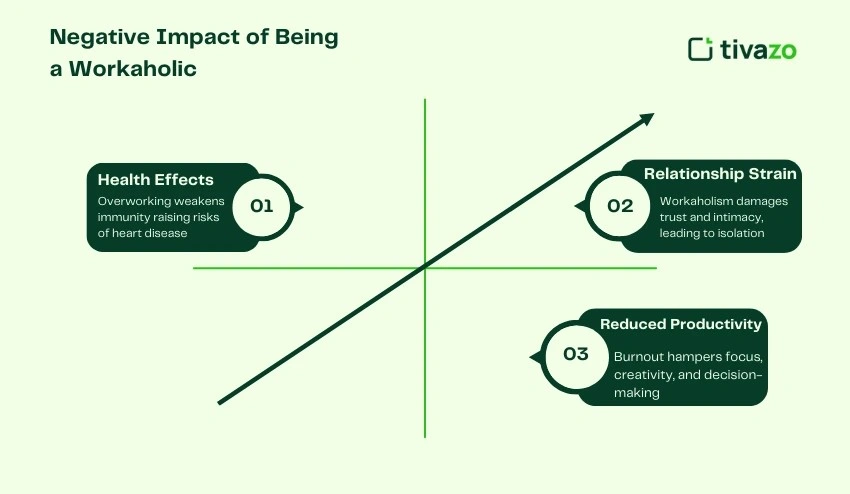
Health Effects
People who have a workaholic attitude have been shown to have increased levels of stress or anxiety, along with physical ailments such as heart disease, hypertension, and chronic fatigue. A workaholic does not have time to relax or sleep, which will ultimately lead to long-term health consequences. Without rest, the immune system may become weakened, leading to an increased chance of disease. Furthermore, the pressure to always work can lead to mental health disorders, such as depression, which will inevitably add to the toll of long-term workaholism.
Relationship Strain
The pressure to constantly work can bring strain to a personal relationship. Workaholics often place family and friends second and feel a sense of isolation and resentment. They may become so fatigued from their imbalance between work and personal life that it becomes unbearable to emotionally connect with family and friends. Over time, strained relationships will lead to loss of trust and intimacy, including partners and friends. Ultimately, harmed relationships can lead to social isolation and loss of emotional support.
Reduced Productivity
In a surprising twist, workaholism does not lead to better productivity. Research shows that constant work can lead to diminishing returns. Excessive work leads to burnout, which makes you unable to focus or work at your best. When we work longer hours, we are not only making bad decisions but also making mistakes as a result of mental fatigue. Pushing ourselves into pure exhaustion to forge ahead often hampers the original strategic and creative thinking that separates us from others.
How to Recognize if You Are a Workaholic
Becoming aware of workaholic traits is the crucial first step to disengaging from your addiction. Most workaholics suffer from workaholism without realizing how extensive their workaholism is until they are aware of the consequences it has on their health, relationships, and well-being. Dedication and commitment are good traits for workaholics, until they take on a larger life of purpose and meaning. Workaholics often experience a lack or gap that assumes there will always be something more to do (kind of) or more time we would be successful at our job, and this can spiral out of control, directly for the health and well-being of our lives.
- Continuously checking emails or messages after work or during leisure time.
- Working late into the night or over a weekend without a break.
- Experiencing feelings of guilt or anxiety about working, or the inability to work.
- Compromising personal time by cramming in work activities.
If you identified with any of the preceding statements, you may be a workaholic. It is vital to recognize the problem before doing something to change it.
5 Proven Strategies to Overcome Workaholism
There are five effective strategies to help break free from workaholism and help you create balance in your life:
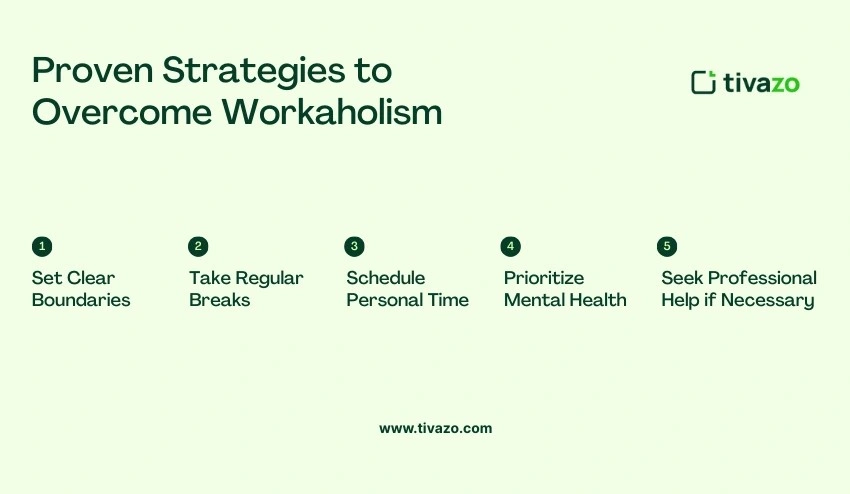
1. Set Clear Boundaries
The first step to dealing with workaholism is establishing clear boundaries between work time and personal time. To start, do not check your email or answer phone calls after work hours. Set time for you, your family, or your loved ones. A workaholic will have trouble establishing boundaries, but boundaries are essential for a healthy work-life balance. Pre-established limits allow you to remove work from personal time to reset and connect with other aspects of life, more deeply.
- Limit your temptation to check emails after work by turning off work notifications.
- Convert a ‘no work’ zone at your home, maybe a limited area to relax.
- Set clear boundaries for colleagues and supervisors by communicating upfront.
2. Take Regular Breaks
Taking breaks during the day can enhance attention spans, lessening deviating thoughts and reducing stress, ultimately increasing productivity. Research indicates that people who take breaks perform better while feeling less fatigued after completing similar work. As a workaholic, this may be something you decline, but continuous work without breaks leads to burnout. Taking time for regular breaks throughout your day allows you to prevent mind fatigue and restore brain function and electrical energy. Work breaks can help you continue to have clear thinking which supports your productivity over time.
- Implement the Pomodoro technique by working for 25 minutes and taking a break for five minutes.
- Step away from your desk and simply do some light stretching or take a walk that allows you to refresh your mind.
- Replace low-energy drinks that can disrupt your sleep or focus (soda, coffee, or other sources) with drinking more water.
3. Schedule Personal Time
It’s easy to allow work to dominate your entire day; however, part of your schedule should also promote personal time for yourself. Think of your personal activities as if they were meetings for work and stick to the schedule. This could be a time to read, exercise, or engage in a hobby that allows you to disconnect from work and provides space for workaholism not to overtake your life. Designating a time slot for self-care will create an opportunity for you to partake in activities outside of work that support your well-being.
- Schedule “me” time in your calendar to participate in a hobby or personal activity.
- Limit work-related projects during the weekend or holiday to allow for time to unwind and relax.
- Establish goals for personal activity, like reading one chapter of a book or participating in a 30-minute workout.
4. Prioritize Mental Health
With a workaholic lifestyle, mental health can become a forgotten priority. However, taking care of your mental health is just as crucial as your physical health. Provide opportunity for stress-relief and incorporate meditative-type exercises into your daily schedule, such as practicing meditation, deep breathing, or yoga.
- Commit to practicing mindfulness or meditation for 10 minutes each morning to help relieve stress.
- Incorporate an aspect of self-care into your daily routine that requires thought and action for the purpose of taking care of your mental health.
- If stress grows to the point that it becomes unmanageable and poorly affects your daily life, consider seeing a therapist or counselor.
5. Seek Professional Help if Necessary
In some cases, people struggle to avoid workaholism due to the conditioning that can occur. In these situations, it may be necessary to seek professional help. Therapists who specialize in addiction and workaholism can help you become aware and develop coping strategies to limit your work life. Seeking help will allow you the process of recovering from workaholism and balance your life.
- Seek a therapist who specializes in work addiction, or workaholism, to foster work-life balance.
- Consider joining a support group for workaholism.
- When possible, have your therapist suggest that you track and report your progress to assist you in your recovery journey.
Why Work-Life Balance is Essential for Workaholics
For a workaholic, work-life balance feels like a far-off fantasy. Regardless, it’s a necessity for sustainability, health, productivity, and overall happiness. Shifting your attention to balance doesn’t mean you’re any less committed to your job; it simply means you recognize that rest and a sense of personal fulfillment will allow you to be sustainable in your work.
When you incorporate work-life balance into your daily routine, you’ll not only improve your health, but you’ll also improve productivity. Workaholic tendencies lead to diminishing returns; when you allot for repair and rest, you’ll walk back into your workplace with your batteries charged, your head cleared, and your focus back.
The Psychological Triggers Behind Workaholism
While there are often psychological triggers for workaholism at play, the triggers lead to anxiety around performance in a lot of cases. Workaholics often feel their worth is tied to their output, almost as if they are obliged to work to meet unreasonable expectations. Addressing these triggers plays a big role in overcoming your workaholism.
Here are some key psychological triggers that contribute to workaholism:
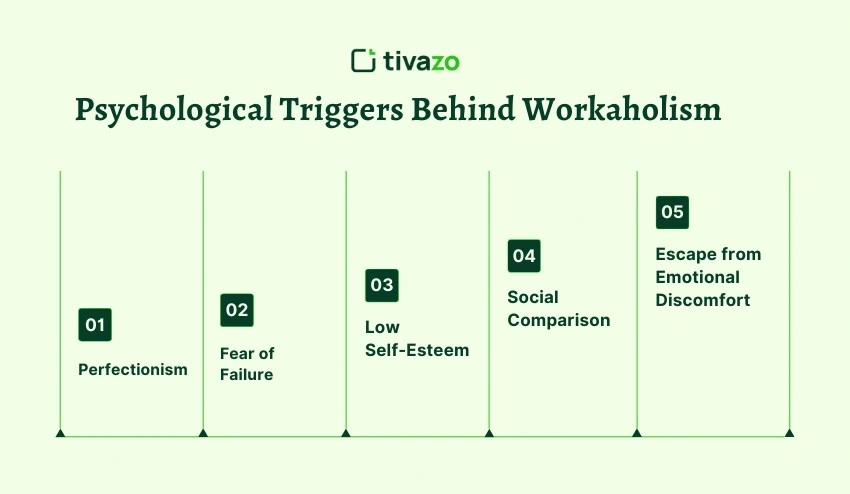
- Perfectionism: The quest to do everything perfectly often leads to workaholism because perfectionists aren’t happy with good enough.
- Fear of Failure: The anxiety surrounding failure or not measuring up leads to overcompensation in work, as the workaholic fears failure.
- Low Self-Esteem: Some people believe their worth is tied to their productivity or work-related accomplishments, and they may overlook other aspects of life.
- Social Comparison: Comparing ourselves to others who seem more productive or successful may motivate us to work longer, to “catch up.”
- Escape from Emotional Discomfort: Additionally, overworking too much may be a way of avoiding dealing with our own life issues, including emotional discomfort. Work may become an avenue to ease anxiety or stress.
The Role of Technology in Promoting Workaholism
In a digital world, technology can serve up workaholism. Notifications, emails, and being compelled to stay in touch with work are features of technology that make it seem like attention to work never really ends. If you are a workaholic, you might feel the need to check your emails or respond to company texts, or any avenue of communication, after work hours.
Here are some ways technology contributes to workaholism:
- Constant Notifications: When you are sent alerts from emails, social media, or platforms like Slack or Microsoft Teams, it fosters a sense of urgency that takes away from the notion of personal time or relaxation.
- Always-On Mentality: The possibility of working remotely and being connected brings on the pressure to be available without being at work.
- Instant Gratification: Technology allows for immediate connection with quick fixes and responses. As a result, it is seen as an expectation that you must respond to all requests right away, and you develop a need to work all the time, which can lead back to workaholism.
- Over-Reliance on Technology: With productivity applications and collaboration features, you can easily become over-connected, over-managing tasks, tracking everything you do for work, and never take a break from mental work.
Workaholism and the Impact on Company Culture
Workaholism is not only a personal issue but also an organizational culture issue. A work culture that values overworking can effectively lead to burnout, lower morale, and decreased production. Managers are integral to avoiding workaholism through their commitment to work/life balance, flexible work hours, and breaks from work.
A culture of caring for personal mental health, and work/life balance will not only avoid workaholism but also increase both engagement and productivity.
Conclusion: Reclaim Your Life from Work Addiction
As you can see, life in recovery from workaholism is an experience worth having. Breaking the habit may be tough, but if these steps are taken, some of the distortions of workaholism should begin to lessen, allowing you to have greater satisfaction with work and the non-work in your life.
Take the first steps from this and begin to reclaim your life. Your health, happiness, and productivity will be grateful.

